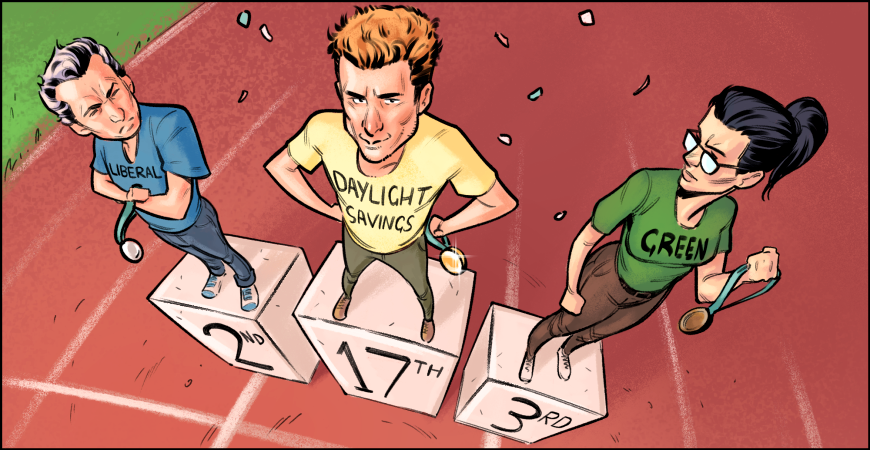The dust has settled on the 2021 election, but the emergence of three unlikely winners could prove to be the catalyst for a long-awaited change to WA’s Upper House voting system.
As the votes were finalised last week, it was confirmed that micro-party Legalise Cannabis WA had secured two Upper House seats despite attracting a total of just 1.98 per cent of first-preference votes statewide.
The Daylight Savings Party’s Wilson Tucker won a spot in the Mining and Pastoral Region with just 0.24 per cent or 98 votes. Mr Tucker, who currently lives in Seattle, has confirmed that he will return to WA to take his seat in Parliament.
According to the WA Electoral Commission, to be eligible for election to the Upper House, candidates must be at least 18, an Australian citizen for at least one year, not be subject to any legal incapacity and be an elector entitled to vote in a district. Candidates do not have to currently reside in WA and under the state’s group voting ticket system, they do not necessarily have to attract a substantial number of first-preference votes.
This leaves the system open to convoluted preference deals between micro-parties, which can see them elected in front of other parties that have secured substantially more first-preference votes.
The opportunity for micro-parties with very low first-preference votes to win seats in our Parliament has earned WA the title of the worst voting system in the country, according to ABC election analyst Antony Green.
Aside from the group voting ticket system, the other fairness issue for Upper House elections is the over-representation of regional voters in Parliament, known as malapportionment. Although more than 75 per cent of WA’s population reside in the Perth metropolitan region, it is only home to half of the state’s six Upper House regions. The population distribution across the regions means that a vote in the Agricultural Region carries almost four times the weight of a Perth vote, while the Mining and Pastoral region has almost six times the power of those in Perth.
Premier Mark McGowan has already flagged potential reform to deal with the issues having stated that “the Legislative Council results have exposed a broken system”.
But what could those reforms look like?
Any proposed changes to the Upper House tend to come with the suggestion that it be abolished altogether, as then-deputy Liberal leader Colin Barnett proposed to The Australian in 1999. His reported view at the time was that having two houses of Parliament was a luxury the state could not afford. In 2007, when he was Opposition leader, Mr Barnett backed away from abolishing the Upper House, but said members should have their electorate offices scrapped.
Although there is some precedent for abolishing the Upper House – Queensland’s Labor Party did it in 1922 – it is unlikely to happen here for several reasons, the first being that WA has a long history of possessing a strong Upper House and, whether we like it or not, West Australians tend to side with tradition. Ironically, there’s perhaps no better example of this than WA’s resistance to daylight savings in the state.
There is also a serious roadblock to any attempt to abolish the Upper House thanks to legislation pushed through in the late 1970s by then-premier Sir Charles Court, which noted that the number of Members of the Legislative Council could not be reduced, or the chamber abolished, without the approval of a referendum.
More importantly, the Upper House is unlikely to go because it serves an important function as a house of review. The review process acknowledges that imperfect legislation carries a risk of unacceptable consequences, and therefore, every care must be taken to get it right before it becomes law. It also allows for legislation to be delayed, providing more time for public opinion to be included in the legislative process, as frustrating as that process may be for the government and the public.
The WA Legislative Council is here to stay, but it could be reformed to make it more representative.
The first reform the McGowan Government could consider would be to borrow from the changes to the Senate voting system.
Prior to 2016, the Senate voting system was similar to WA’s Upper House. Voters could cast their ballot for a party by marking just one box above the line, leaving the rest up to the preference deals worked out by political parties. Or they could vote for individual candidates below the line by marking a large number of boxes – the South Metropolitan Region had 64 this election – without making a mistake. The system led to incongruous results in 2004, 2010 and 2013, before a new system was implemented in 2016.
Now, voters are able to number at least six boxes above the line for the parties or groups of their choice, or at least 12 boxes below the line for individual candidates of their choice.
Despite concerns from smaller parties, the 2016 election showed that they can still gain seats, but they must have reasonable first preference flows. It also discourages those with specific constituencies, such as platforms based on religion or environmental concerns, from splitting off into fringe or single-issue parties.
This reduces the length of the ballot paper, makes it easier for voters to navigate, and it reduces incongruent results.
The second fix the McGowan Government could explore would be to address the malapportionment issue by re-examining the number of seats available in each region so that representation is better aligned to population.
This could prove to be a bigger challenge than fixing the group voting ticket system as it would be strongly opposed by the Nationals and regional Liberals like Steve Thomas, who had his country seat of Capel abolished in 2008 before moving to the Upper House.
Regardless of what electoral reforms the Government investigates, the Premier has made it clear that it is on the agenda.
 ReGen Strategic
ReGen Strategic